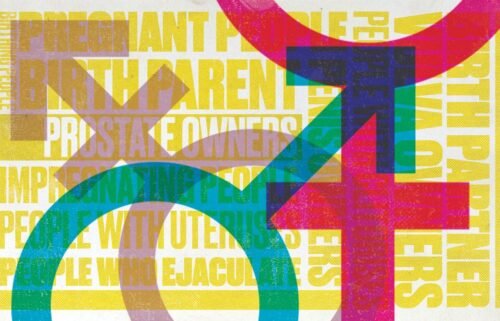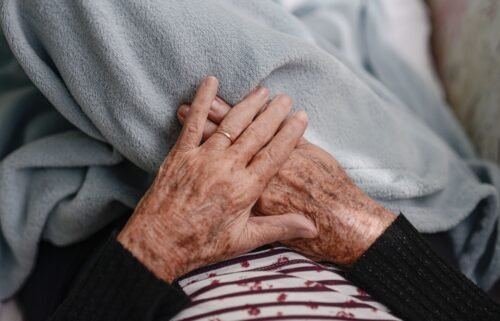From ‘menty b’ to ‘grippy socks,’ internet slang is taking over how we talk about mental health

Phrases like "menty b" and "depressy" have become commonplace online as shorthands for real mental health terms.
(CNN) — In the midst of vacation planning, Natalie Williams was feeling overwhelmed.
Life was hectic, and booking a trip was at the bottom of a to-do list already flooded with other various tasks and obligations. She wasn’t even sure if she still wanted to go. Still, her friends asked: When are we booking this?
“When I get stressed, it can be pretty debilitating,” Williams told CNN. “This one was just like, ‘I don’t even have time to think about going on a vacation.’”
So she went on X, formerly known as Twitter, wrote a message and hit post: “The only vacation I’m open to taking rn is a grippy sock vacation.”
The post was meant to be tongue-in-cheek. “Grippy sock vacation” refers to a stay in a psychiatric hospital, where patients are often given grippy socks. Williams didn’t actually want to stay at a psychiatric hospital, but her stress was real.
Williams, a 27-year-old DJ in Philadelphia who goes by Prosper., said she often uses humor as a coping mechanism for real-life struggles. She and her friends use the phrase “grippy sock vacation” a lot, she said.
And she isn’t the only one. In recent years, phrases like this have become ubiquitous, particularly online: “stressy depressy,” short for stressed and depressed, “menty b,” short for mental breakdown, and “suey,” short for suicidal, are just some of the jokey shorthand people have begun using to talk about mental health and mental illness.
On one hand, using these terms can help destigmatize mental illness, making light of a usually dark circumstances and providing a way to talk about mental health without fear of reprimand.
That can be a positive.
But for Dr. Nicholas Westers, a clinical psychologist at Children’s Medical Center Dallas, simply talking about mental health isn’t always a good thing. How you talk about it matters, too, he said. And the use of these phrases, he said, can have some downsides.
Cutesy language can help reduce stigma around mental health
“Grippy sock chic,” Erikka Nelson, 43, posted on X, with an image of her in a hospital bed. Nelson, to be clear, was just making a joke about a recent surgery — she was not in a psychiatric facility, nor has she ever been. But she has been diagnosed with depression and anxiety, Nelson told CNN, and has had her share of mental health struggles.
For Nelson, using this type of language helps bring levity to the situation. It’s way to share a struggle without being “mundane or downtrodden,” she said. And it helps her feel seen — by sharing personal challenges online, people realize it’s not all rainbows and sunshine for everyone.
“I think it can help, to where it’s like ‘I’m not the only person going through this,’” Nelson said.
Even in comments, Nelson said she sees people making connections and helping each other feel less alone.
A 55-year-old cab driver in New York said using this type of lingo might also be a way to build community with people similar to you, who may be going through the same thing. They made a post on X about taking a grippy sock vacation, and said they have struggled with mental illness throughout life. They spoke to CNN on the condition of anonymity, citing the sensitive nature of these topics.
“A lot of my jokes are centered around mental illness, LGBTQ, or neurodivergent related jokes, which means that most of my followers are within one of those three categories,” they said.
“I think younger people do this unintentionally by adopting online lingo that would only be really understood by specific groups of people, meaning people outside of those groups are less likely to see let alone interact with those posts.”
But the potential benefits aren’t just for people who have a diagnosable disorder. Even for those who may not struggle with mental illness, Nelson said the commonality of this type of language might help them realize the importance of taking care of their mental health.
“Mental health is part of your physical health, and I think the internet, social media, has definitely played a part in that (association),” she said.
But one doctor says it could also further stigmatization
Of course, using these phrases can help destigmatize mental illness and mental health issues, Westers, the clinical psychologist, said. Acknowledging what they’re experiencing may even help people actually address their mental health and seek the help they need.
That being said, such language could have the opposite effect, too. Using these phrases could be a way for some people to distance themselves from the experience using humor, Westers said.
While that can be a coping mechanism, Westers said research shows that using these avoidant strategies is often done by people who have self-labeled or self-identified a mental illness, without a diagnosis from a doctor. People who have self-labeled or self-identified are also less likely to seek help via therapy or counseling, Westers said, but more likely to seek medication.
Westers used depression as an example. Saying something like “the depresh got me” could be a sign that a person is distancing themselves from the symptoms. And if that person hasn’t actually been diagnosed with depression, they could be more likely to seek medication rather than go to counseling or therapy first, which makes overcoming their circumstances more difficult.
Using these terms can also eliminate personal control from the experience, making it seem like the person is powerless against the situation.
“So, ‘I’m having a menty b’ — well, there’s no control there,” Westers said. “That reflects very little control over the distress and doesn’t reflect any pursuit of healthy coping strategies.”
There’s also concern that these terms could lead to a trivialization of serious mental health issues, Westers said.
Making a quip like “I’m going to kill myself” when feeling down or “I’m so OCD” when you just like organization can also create stigmatization around mental health, Westers said. That extends to these internet shorthands.
“These trivial uses of these kinds of terms can really minimize and invalidate people that really struggle,” Westers said.
When the funny is no longer funny
With minimization can also come overinterpretation. Someone going through sadness after a breakup — a relatively common and normal experience — may now think they’re depressed, Westers said, when actually they’re experiencing heartbreak. Applying a clinical label to a saddening situation can make it even more difficult to differentiate when a situation is actually serious, Westers said, and could also inadvertently enforce stigma.
All of this signals that there are limits to the jokes, even if they are also coping mechanisms — a point when the funny is no longer funny and real consequences can occur.
Williams, the DJ struggling with planning a vacation, noted that sometimes, using these cutesy phrases can be a way for people to slip their pain under the rug. Mental health resources, including therapy, aren’t always accessible, she said, and using these little sayings or words could be a way “to help them get through.” But that can also be a problem.
“In my personal experiences with my friends, sometimes I don’t even know that they’re going through stuff because people mask it, or people aren’t able to say, ‘Hey, I’m having a really hard time and I need a friend right now,’” Williams said.
In the past, Westers said, mental health was so stigmatized that people never talked about it, for fear of being sent to an institution or being considered “crazy.” Now, the pendulum seems to be swinging — and yet the consequences are still there.
“It’s possible that our culture is moving to the other extreme, where we’re going to trivialize it and destigmatize it so much; everyone’s going to talk about it using fun language,” Westers said.
And that, he said, can be just as bad.
The-CNN-Wire
™ & © 2023 Cable News Network, Inc., a Warner Bros. Discovery Company. All rights reserved.


